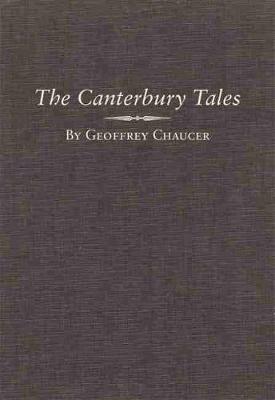Reviewed by Michael @ Knowledge Lost on
The Fourteenth Century was a violent and unstable period of time in English history; not only was the Hundred Years War raging with the French (1340-1450) but there was the Black Death (1348), famines and rebellions (the Peasant’s Revolt of 1381). This was an unstable time, things were changing; even the Catholic Church which often had a community-building nature was corrupt and abusing its power. Near the end of the 14th Century the Church was a mess, there was the sale of church offices as well as indulgences and pardons as well as greed and moral corruption. The Western Schism (or Papal Schism) took place from 1378 to 1418 where the Church was divided and several men simultaneously claimed to be the true pope. This should give you an idea of just what kind of instability the people in The Canterbury Tales faced.
However this book explored more than this instability; it is a medieval tapestry exploring the whole feel of this period but it might be easier to narrow it down to three major themes. The political, since The Norman conquest of England (1066) the country was gradually processing toward political consolidation and unification, a theme that comes through a number of times within this book. Social and economic changes, following the story of many people around England as urbanisation takes affect and London becomes a more modern city. Finally The Canterbury Tales explores the cultural changes of a changing time; social classes are shifting but still play a big role within this country.
I know I am probably looking at this book through modern eyes but this is the best way I found to wrap my head around what is written. Luckily I didn’t have to read this book in Middle English and got to rely on Nevill Coghill’s translation but I am not going to deny that this was a very difficult book to get through. I found trying to understand the situation as if England changed from medieval into a modern society helped me pick up on the social, economical and political changes. I know London didn’t become an urban city like we know it today but it helped me follow the shifting times. I am not sure if viewing the book this way helped me understand it better or sent me down the wrong path but it doesn’t matter, is there a right or wrong way to interpret literature?
Symbolism, imagery and allegory play a huge part in Chaucer’s tales but it is hard to go into details on this topic because they change from story to story. What I found surprising about this book is not the beautiful poetic lines but how real and raw the emotions played out in each tales. I read an exploration into marriage, growing old, morality, rape, sexual pleasure and even anti-social behaviour. I never expected this from the book and it really surprised me. From a general overview The Canterbury Tales looks at a changing time but each tale goes into a personal look into different people’s lives.
As the narrator, Geoffrey Chaucer plays with the narrative from tale to tale; sometimes he comes off as naïve but then he can be very knowledgeable. I picked up on how heavy he is on the irony, but in all honesty I didn’t have enough knowledge of the times to be able to explore this as much as I would have liked. If it wasn’t for the fact that I read this for a university subject I might have really struggled with this book. A lecture and some reading guides really helped me get something out of this book but like I said, I don’t have enough knowledge of medieval history to fully grasp this book in its entirety.
I mentioned to my dad that I had to read this book and he told me not to bother; he called it crude and vulgar but that only made me excited. I understand now that he had to read this book for high school and found it difficult but I can’t say vulgar is a good word to describe this book. Sure, there are some crude scenes but life is never full of well-mannered moral people. Chaucer explores life at this time and doesn’t shy away from the tough topics; but I think that is what makes this book so great.
This review originally appeared on my blog: http://literary-exploration.com/2014/11/07/the-canterbury-tales-by-geoffrey-chaucer/
Reading updates
- Started reading
- 3 October, 2014: Finished reading
- 3 October, 2014: Reviewed
